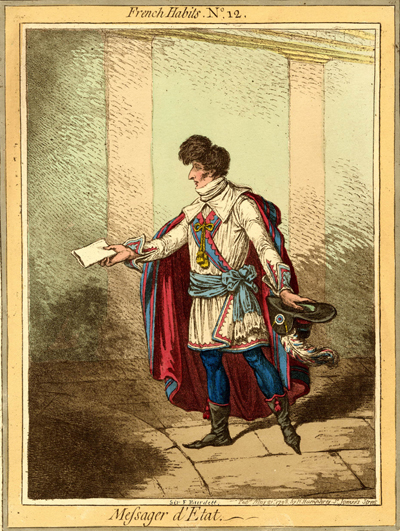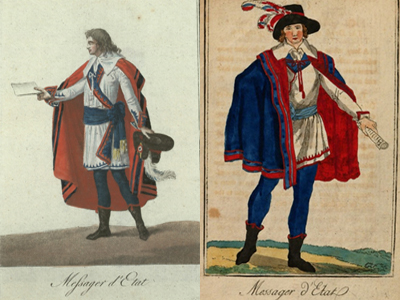French Habits: Messager d'Etat
This is the last in a series of twelve plates in which Gillray portrays members of the Whig opposition wearing the new ceremonial robes designed by Jacques-Louis David for the prominent public officials of the French Directorate. In this plate, Sir Francis Burdett is shown as a Messager d'Etat.

© Trustees of the British Museum
The description for the dress of the Messager d'Etat is as follows:
A long white waistcoat, a blue sash, blue pantaloons, a short blue cloke with red lappel; a black round hat, with a white feather streaked with blue and red; half boots.
More than most of the other French Habits, Gillray borrows elements from both his sources to create his version of the Messager d'Etat. As in the French illustration, Sir Francis is shown delivering his message with hand outstretched and hat in hand as if he has just arrived to make his delivery. He is wearing the prescribed white waistcoat, blue sash, a long (not short) cloak, blue pantaloons, and half boots. But as in the English illustration, his waistcoat is bordered in red and the sash is light blue. The plume of his hat is closer to the English text description than either of the French or English illustrations. And the ribbon that crosses his chest reverses the colors in the French illustration.

of the Robes Prescribed for the Messager d'Etat [1796/97]
From all that I can tell, this is the first print from Gillray or any of the major caricaturists to feature Burdett. Other Gillray prints with Burdett, however, quickly followed, including: Pigs Meat. . . (June 22, 1798), Nelson's Victory. . . (Oct.3, 1798), Doublures of Characters (Nov. 1, 1798), and Meeting of the Monied Interest (Dec 13, 1798). He had become a member of Parliament in 1796, and by 1798 he was an outspoken critic of the Pitt administration's policies, protesting the war with France, the suspension of habeas corpus, the vile conditions in London's prisons, and the resumption of the Land Tax. At this stage of his career, however, Gillray seems to have regarded him as a pretty boy and a junior Whig, so that may account for him being relegated to the role of Messager d'Etat (but with a great outfit).
Sources and Reading
- Commentary from the British Museum on French Habits: Messager d'Etat.
- "Francis Burdett," Wikipedia
- Collection des nouveaux costumes des autorités constituées, civils et militaires
- Dresses of the Representatives of the People. . .
- Thomas Wright and R.H. Evans, Historical and Descriptive Account of the Caricatures of James Gillray #196
- Thomas Wright and Joseph Grego, The Works of James Gillray, the Caricaturist; With the History of His Life and Times pp. 239-240.
Comments & Corrections
NOTE: Comments and/or corrections are always appreciated. To make that easier, I have included a form below that you can use. I promise never to share any of the info provided without your express permission.